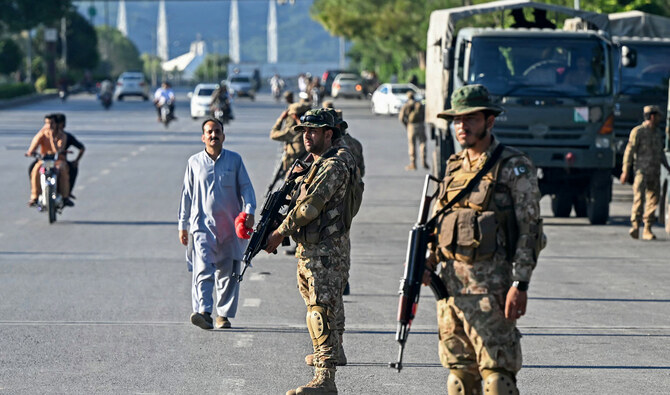ISLAMABAD: Pakistan authorities were on Sunday preparing to shut down the capital ahead of a Shanghai Cooperation Organization summit, overshadowed by recent militant violence and political unrest.
The Indian Foreign Minister Subrahmanyam Jaishankar, Russian Prime Minister Mikhail Mishustin and Chinese Premier Li Qiang will be among senior regional government officials attending the two-day conference on Tuesday and Wednesday.
In the weeks leading up to the summit, Pakistan’s authorities have cracked down hard on dissent, banning an ethnic nationalist movement and introducing new laws that restrict protest in the capital.
They have also arrested hundreds of supporters of jailed opposition leader Imran Khan who attempted to march in Islamabad earlier this month.
A deadly attack on a convoy of Chinese engineers in the mega port city of Karachi last week has also deepened security fears in a country where separatist groups routinely target Chinese nationals.
Islamabad has authorized the deployment of troops on the streets for the duration of the summit.
Imtiaz Gul, a security analyst and executive director of the Center for Research and Security Studies, said the meeting holds great significance for a country that’s “not seen as safe.”
“The government claims to have made elaborate security arrangements and understandably so because it has to make sure that the event passes off peacefully without any untoward incident,” he told AFP.
The SCO comprises China, India, Russia, Pakistan, Iran, Kazakhstan, Kyrgyzstan, Tajikistan, Uzbekistan and Belarus — with 16 more countries affiliated as observers or “dialogue partners.”
All visiting member nations are expected to send government heads apart from Pakistan’s arch-rival India, who will dispatch its foreign minister in a rare visit to its neighbor.
The SCO is sometimes touted as an alternative to the Western-dominated NATO military alliance.
As China’s claim over Taiwan and Russia’s invasion of Ukraine have seen them clash with the US and Europe, analysts say the SCO is one forum where they are trying to curry regional influence.
While the SCO has a mandate to discuss security, the Islamabad summit is due to focus on trade, humanitarian and cultural issues.
Pakistan’s domestic concerns are likely to dominate the sidelines of the summit, however.
Khan’s Pakistan Tehreek-e-Insaf (PTI) party has threatened to stage protests, a week after scattered demonstrations by supporters saw the capital locked down for three days with mobile phone signal cut and exit and entry points blocked.
“The PTI doesn’t want to showcase the positive side of Pakistan to the world,” accused Ahsan Iqbal Chaudhary, minister for planning, during a press conference Saturday.
“Instead, they aim to present a picture of the country filled with tear gas and unrest.”
Authorities have declared a three-day public holiday for Islamabad and the neighboring city of Rawalpindi starting Monday, along with road closures to reduce movement around the area.
The “red zone” government quarter hosting the summit meanwhile has been spruced up with manicured lawns ringed by razor wire.
Cash-strapped Pakistan is particularly at pains to protect citizens from China because it is a major investor, sending funds and staff for million-dollar infrastructure projects.
Pakistan is grappling with a broad uptick in militancy coinciding with the Taliban’s 2021 return to power in neighboring Afghanistan, where Islamabad claims attackers are now taking shelter.
Pakistan frets over security ahead of SCO summit
https://arab.news/b3de2
Pakistan frets over security ahead of SCO summit

- Prime ministers of Russia, China among senior regional government officials attending SCO summit
- Pakistan’s authorities have cracked down hard on dissent in the weeks leading up to the event
Pakistan’s Engro executes $475 million Islamic financing deal to expand telecom infrastructure

- Islamic banking accounts for over a fifth of Pakistan’s banking assets amid a shift toward Shariah-compliant finance
- The deal brings more than 10,000 telecom towers under Engro’s control, enabling their shared use by multiple operators
KARACHI: Pakistan’s largest conglomerate Engro Corp. has completed a Rs133 billion ($475 million) Islamic financing deal to acquire telecom tower company Deodar, expanding its telecom infrastructure business as the country seeks to strengthen digital connectivity, the company said on Friday.
The transaction, structured entirely through Shariah-compliant financing, brings more than 10,000 telecom towers under Engro’s control and marks one of the largest Islamic financing deals in Pakistan’s infrastructure sector.
Engro, which has major interests in energy, fertilizers, food and petrochemicals, said the acquisition would allow it to scale shared telecom infrastructure, under which a single tower can host multiple mobile network operators, lowering costs and reducing duplication as Pakistan prepares for next-generation digital services.
“My congratulations to the Dawood family and Engro, the Islamic bankers and conventional banks through their Islamic windows on being able to put together a deal of this size,” State Bank of Pakistan Governor Jameel Ahmed said at a ceremony marking the transaction, referring to the company and its chairman. “This is a great achievement which has been supported by the banks.”
The deal was supported by a group of local banks, including United Bank Limited and Meezan Bank, Engro said, highlighting the increasing role of Islamic financing in funding long-term investment in Pakistan.
Islamic banking, which operates without interest and is based on profit-and-loss sharing structures, accounts for more than a fifth of Pakistan’s banking assets, and authorities have said they aim to transition the financial system toward Shariah compliance over the coming years.
The acquisition of Deodar, which was originally carved out of mobile operator Jazz, also aligns with government efforts to digitize the economy by expanding broadband access and supporting digital payments, e-commerce and online public services, though progress has remained uneven due to infrastructure and regulatory challenges.










